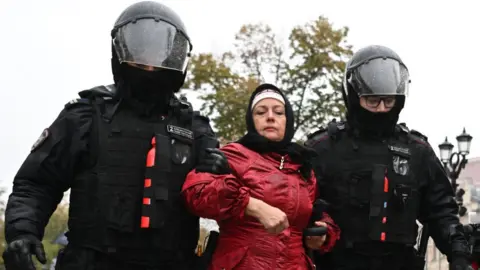Ukraine war: Hundreds arrested as Russian draft protests continue
 Getty Images
Getty ImagesHundreds of people have been arrested by authorities as protests against Russia's new "partial mobilisation" continue across the country, an independent rights group has said.
OVD-Info said 724 people were detained across 32 different cities on Saturday.
Widespread demonstrations have broken out since President Vladimir Putin announced plans to draft 300,000 men to fight in Ukraine.
Unsanctioned rallies are banned under Russian law.
But Mr Putin's move to draft civilians into the military has sparked large scale protests in urban areas, with more than 1,000 people being detained at demonstrations earlier this week.
In Moscow, news agency AFP reported witnessing one demonstrator shouting "we are not cannon fodder" as she was arrested by officers.
And in St Petersburg, Russia's second city, one man told reporters: "I don't want to go to war for Putin."
Seventy-year-old Natalya Dubova told AFP that she opposed the war and confessed she was "afraid for young people" being ordered to the front.
Some of those arrested on Saturday reported being given their draft papers after being detained. The Kremlin defended the practice earlier this week, saying "it isn't against the law".
Moscow has also approved harsh new punishments for those accused of dereliction of duty once drafted.
Mr Putin signed fresh decrees on Saturday imposing punishments of up to 10 years imprisonment for any soldier caught surrendering, attempting to desert the military or refusing to fight.
The president also signed orders granting Russian citizenship to any foreign national who signs up to serve a year in the country's military.
The decree, which some observers have suggested displays how severe Moscow's shortage of troops has become, bypasses the usual requirement of five years of residency in the country.
Elsewhere, other young Russians continue to flee mobilisation by seeking to leave the country.
On the border with Georgia, queues of Russian cars stretch back more than 30km (18 miles) and the interior ministry has urged people not to travel.
Local Russian officials have admitted that there's been a significant influx of cars trying to cross - with nearly 2,500 vehicles waiting at one checkpoint.
The admission is a change of tone from Russia, with the Kremlin describing reports of Russians fleeing conscription as "fake" on Thursday.
One man the BBC spoke to in Vladikavkaz in North Ossetia, on the Russian side of the border, said he could see car registration numbers from all over Russia.
"Our people don't have the correct information about the situation in Ukraine," he said. "Also, what I can say about people that I've been speaking with… it's simple, people don't want to go to war."
Meanwhile, Finland has also seen a sharp increase in the number of Russians seeking to enter the country.
Matti Pitkaniitty, a spokesperson for the country's Border Guard, said the number of Russians arriving had more than doubled since last week.
On Friday, the government announced plans to stop Russian tourists entering the country.
"The aspiration and purpose is to significantly reduce the number of people coming to Finland from Russia," President Sauli Niinistö told the state broadcaster.
Several other neighbouring states have already ruled out offering asylum to Russians seeking to avoid the draft.
"Many Russians who now flee Russia because of mobilisation were fine with killing Ukrainians," Latvia's Foreign Minister Edgars Rinkēvičs said. "They did not protest then. It is not right to consider them as conscientious objectors."
On Friday, the Kremlin revealed a host of occupations it said will be exempt from conscription aimed at boosting its war effort in Ukraine.
IT workers, bankers and journalists working for state media will escape the "partial mobilisation" announced by President Putin on Wednesday.
But some have cast doubt on the truth of the Kremlin's claims, and reports have been emerging of Russian men who do not meet the criteria being called up by local recruiting officers.
Margarita Simonyan, the editor of the state-run media outlet RT, posted to Twitter a list of elderly and disabled citizens ordered to report for duty.
